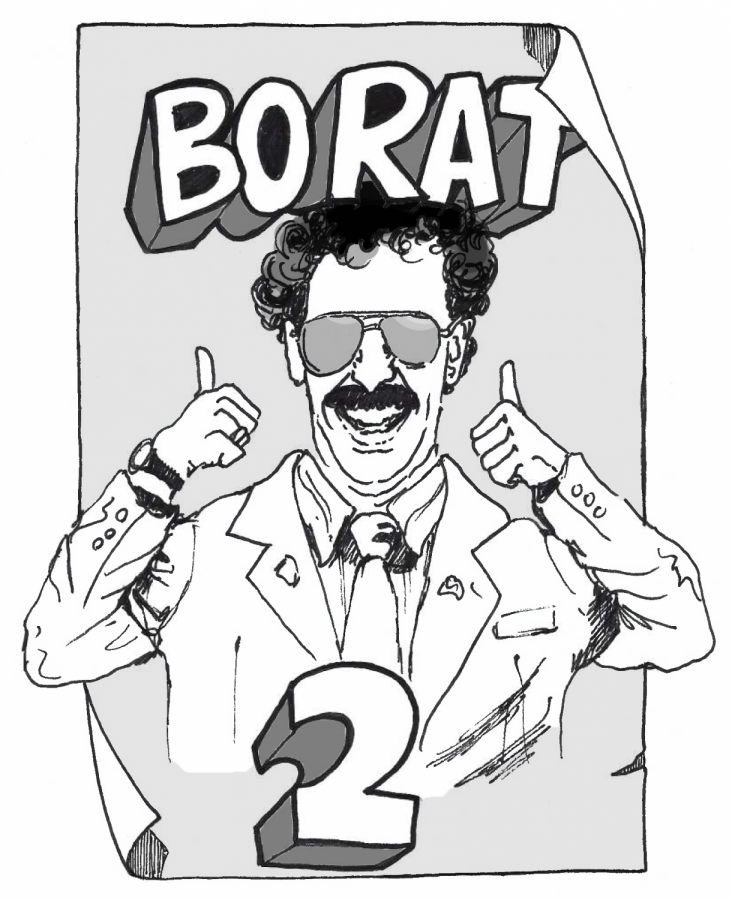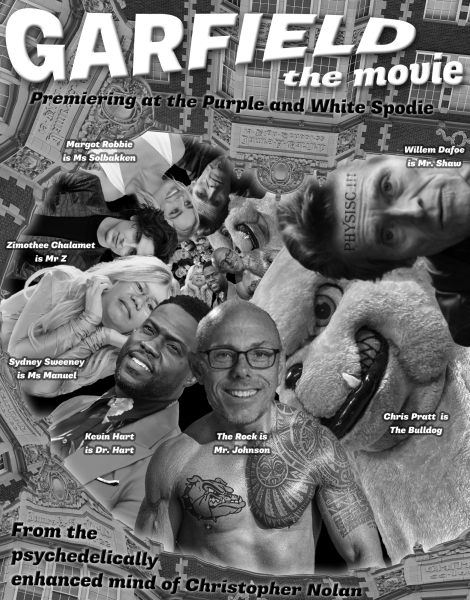Borat 2: The Sequel We Didn’t Need but Got Anyway
Reviewing the new Borat movie.
This review contains Spoilers for Borat Subsequent Moviefilm.
CW: Anti Semitism, Islamophobia, Romaphobia, Political Extremism
Borat Subsequent Moviefilm, the sequel to Sasha Baron Cohen’s irreverent 2006 mockumentary, Borat, was released on Amazon Prime in late October, less than two weeks before the 2020 presidential election. This timing is no coincidence either. Borat Subsequent Moviefilm was made with one specific goal in mind: satirizing the regime of “McDonald Trump.”
To put it simply, Borat Subsequent Moviefilm does not succeed at this goal. For starters, many of the smaller political jokes are either unoriginal, unfunny, or uninspired. It truly is a sad day when Sasha Baron Cohen is cracking Trump jokes that don’t even make it past SNL territory, and in a Borat movie no less. Even the bigger scale political bits in Subsequent Moviefilm are underwhelming when compared to similar scenes in the original.
Not only is the scene at the “March for our Rights” rally less funny than the Rodeo scene in the first Borat, it’s also worse political commentary. Getting 15 people at a far-right rally to chant along to a song about murdering journalists isn’t even in the same ballpark as getting an entire stadium of average Virginians to cheer in support of “George W. Bush [drinking] the blood of every man, woman, and child in Iraq.”
Some have praised the scene at the Pence rally for putting the corrupt authoritarianism of the Trump/Pence administration on display, but it’s common knowledge at this point that the administration intentionally downplayed Covid, and is it really that surprising that their supporters bought it? Granted, the scene is still fairly funny, but not because of its political aspects, and it isn’t nearly as funny as the naked fight at the Mortgage Broker’s Bouquet in the original.
The sequence where Borat stays with the QAnon conspiracy theorists is somewhat eye-opening, but it comes across as so fake that it loses most of its value, not to mention that the interview with the manager of the rodeo in the original paints a far more damning picture of the American far-right.
As for the Rudy Guliani interview, I won’t get into too much detail, but suffice it to say that the media’s coverage of it made it out to be a lot more scandalous than it actually was. As a result, it makes for a fairly underwhelming climax, especially when you compare it to the climax of the first Borat movie, where he finds salvation at a cult-like Pentecostal camp meeting.
Most of the non-political jokes in Borat Subsequent Moviefilm are also notably worse than the original. Take the Kazakh parenting book, which could have been a great one-off joke, but instead is turned into a major plot device, and quickly becomes very tiresome. The conversation with the pastor at the health clinic could have been another highlight, but the setup for it is so forced that the joke was all but ruined. Many have hailed the scene at the synagogue as “powerful” and “heartwarming”, but Borat’s Jew costume was so over the top that I couldn’t begin to take their conversation seriously.
However, the most egregiously uncreative bit in Borat Subsequent Moviefilm has to be the dance that Borat and his daughter perform at the debutante ball in Georgia. Though the original Borat was also rampant with shock humor, the reason it worked was because Sasha Baron Cohen’s performance was so believable that no one even realized they were being pranked.
The dance at the debutante ball is the polar opposite of this. In the scene, not only is Borat in disguise, but Sasha Baron Cohen makes absolutely no attempt to have the character come across as a real person. The scene is pure shock humor, and adds nothing to the overall storyline or satire. If any scene in Subsequent Moviefilm is emblematic of the stark difference in quality between the two Borat movies, it’s this one.
But Sasha Baron Cohen’s portrayal of Borat isn’t just unconvincing in this scene, it’s unconvincing throughout the entire movie. It seems that in the 14 years since the original Borat movie, Baron Cohen forgot that Borat’s unusual mannerisms were what made the character feel real. Anybody can go around doing and saying crazy things, but Borat’s awkward gestures, abnormal facial expressions, and inaccurate readings of social cues were what made him come across as genuine. In Borat Subsequent Moviefilm, Borat feels like a caricature, not an actual character, which makes it much harder to care about the overarching story that ties the movie together.
It also doesn’t help that the story is poorly written. The father/daughter narrative feels incredibly forced, as does the ending, where Kazakhstan becomes a “feminist nation” and starts celebrating the “Running of the American,” a play on the “Running of the Jew” in the original. However, by that point I had completely lost interest in both Borat’s character and the narrative of the movie, so it just felt inconsequential.
The twist that came before the ending was also disappointing. The idea of Borat being the one that spread Covid around the globe was a funny idea, but the lack of sufficient foreshadowing was very disappointing. Had Borat been coughing on people the whole movie, it would have felt like a real payoff. In reality, it was obvious that Baron and co. thought of the twist after most of the movie had been filmed, and then added the “gypsy tear” injection scene so it wouldn’t be completely out of nowhere.
Sasha Baron Cohen did face many limitations while making Borat Subsequent Moviefilm. The movie was made in less than a year, and much of it was filmed during the pandemic, which is probably why it felt somewhat rushed and unfinished. Baron Cohen is also much more famous now than when the original Borat was filmed, which no doubt made it harder to find interviews and venues where he wouldn’t be recognized when filming the sequel. But it begs the question: if making Borat Subsequent Movefilm was destined to be such a difficult endeavor, why even do it in the first place? I think there’s a reason why Sasha Baron Cohen went so many years without making a Borat sequel, and it’s sad to see him abandon his artistic integrity just to try to push a political message. In the end, though Borat Subsequent Moviefilm has its moments, Borat: Cultural Learnings of America for Make Benefit Glorious Nation of Kazakhstan still reigns superior, both as a “moviefilm” and as a political satire.




